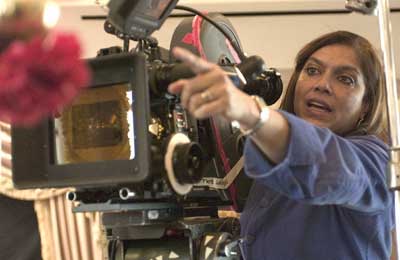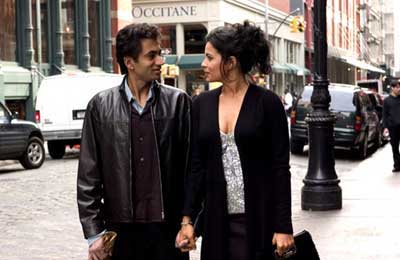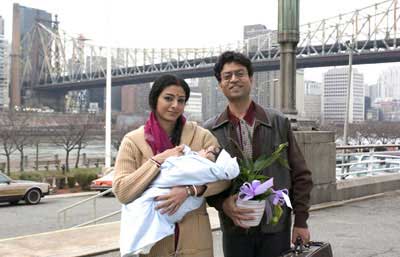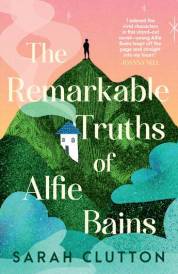Mira Nair The Namesake Interview

MIRA NAIR RETURNS TO HER ROOTS
EXCLUSIVE INTERVIEW by Paul Fischer in Los Angeles.
Born in a small Indian town and educated at Harvard, Mira Nair describes her life as having been spent "between two worlds". Primarily concerned with telling the stories of people on the margins of society, she has made four nonfiction films examining aspects of Indian life, winning best documentary prize at the American Film Festival for "India Cabaret" (1985), a controversial portrait of strippers in a Bombay nightclub.
Nair's highly acclaimed first feature, "Salaam Bombay!" (1988), was a riveting and uncompromising tale of urban street life in the tradition of Bunuel's "Los Olvidados" and Hector Babenco's "Pixote". "Salaam Bombay!" featured fine performances from non-professional child actors and won both the Camera d'Or (for best first feature) and the Prix du Publique (for most popular entry) at Cannes. She followed up with "Mississippi Masala" (1992), a winning interracial romance set in the American South and starring Denzel Washington and Sarita Choudhury. (Nair divorced from her first husband, Mitch Epstein, who was co-producer and production designer of both features).
For her next Hollywood outing, Nair eschewed the trappings of her ethnic background, instead focusing on a Cuban clan and their struggles in America in her accessible adaptation of Christine Bell's novel "The Perez Family" (1995) starring Anjelica Huston, Marissa Tomei and Alfred Molina. The director then returned to India, circa the 16th Century, for the sensual feature "Kama Sutra: A Tale of Love" (1996), in which two young women--one a pampered princess, one a lowly servant--engage in a struggle for a man using the tried and true techniques of the fabled sexual tome. Less successful was "My Own Country" (1998), Nair's telepic adapation of East Indian physician Abraham Verghese's autobigraphical tale of his experiences attempting to find a treatment for AIDS in 1980s Tennessee.
The director struck creative gold with her much-admired Indie "Monsoon Wedding" (2001), which with an Altman-sized cast of characters and a colorful, quirky wit depicted an Indian family's preparations for a modern-day arranged marriage. Nair also collected critical kudos for the HBO telepic "Hysterical Blindess" (2002), a bittersweet look at the relationships of a working class Jersey woman (Uma Thurman) with her best friend (Juliette Lewis), mother (Gena Rowlands) and the less-than-inspiring father of her child (Justin Chambers). After lensing the "India" segment of the multi-segment drama "11'09''01 - September 11" (2002), chronicling the aftermaths of the Sept. 11 terrorist attacks from various international perspectives, Nair took the helm of a stylish adaptation of William Makepeace Thackeray's classic late 19th Century novel "Vanity Fair" (2004), starring Reese Witherspoon as the more sympathetic than usual social climber Becky Sharp.
Her latest film is The Namesake. Based on the acclaimed novel, the film centers on Gogol, a 2nd generation Indians born in New York, ultimately torn between the cultures that both separate and divide him. Ms Nair spoke exclusively to Paul Fischer.
 Paul Fischer: So was this the right time in your life to make this film?
Paul Fischer: So was this the right time in your life to make this film?
Mira Nair: Absolutely, Paul. I mean this was a bolt of lightning when I read the book. I completely, opened it - you know I read it six months after I bought it and I took it with me on a plane journey when I was shooting the end of Vanity Fair in India and I happened to be in abject mourning for losing someone very close to me who died very suddenly in New York City six weeks earlier, so I read this book in a fog of grief really. I was first so shocked that Jhumpa had understood what it felt like to bury a parent in a country that is not home which was the heart of the book for me so this book was like a solace to me,. And I wasnt looking for a movie to make - I had two movies I was supposed to be making - and I just knew that this was the one that I could tell and make and I would make it like no one else and it was a way to actually understand what I was going through myself. Only on reflection later did I see the uncanny kind of similarity between the road that the Ganguli family takes from Calcutta where I had also left in the 70s to come to New York, Cambridge MAS and then New York where Id also come as an undergraduate. And I have lived between these cities for many years now.
Paul Fischer: Is there a certain degree of catharticism for you to make a film that deals with the Indian/US cultural mix I guess.
Mira Nair: Well not, the catharsis came from dealing with or being able to express or capture melancholy and loss. That is the catharsis of it. But the sort of map of it through Calcutta and New York was like the banquet of it for me, the fact that I love these two cities. I know them intimately and I had a very clear idea very early on after reading the book as to how I would film it, how I would film the two cities as if they were one , how I would create - actually let the audience viscerally not know where they are, like Ashima sometimes does not know where she is. Thats the state of being of the in-between world of an immigrant, you know. So I was very clear how to approach it.
Paul Fischer: One of the things about the book I guess, which must be very difficult when doing an adaptation like this, is that its very rich in its descriptive language and deals very specifically, and almost very intimately, with Indian culture and customs. Was it very hard for you to try and bring that across cinematically and make it create a sense that the audience knows what this culture is about yet have to do so very quickly. I mean, for example, the scene where he shaves his head is not necessarily an easy scene for Westerners to appreciate but in the book its much more specifically detailed. So what were the challenges from that standpoint.
Mira Nair: Actually, well you know, he doesnt shave his head in the book.
Paul Fischer: Oh he doesnt?
Mira Nair: No. He remembers himself as a young boy laughing at his bald father who shaves his head in his bathroom after his father died. We invented that for the story. Because sometimes the book is very interior in its expression of emotion and despair and whatever. Its very internal. And a movie is about taking the audience on a journey as well and I thought, and Sooni came up with this idea, my writer, to have him shave his head and I came up with the idea, which often happens when you are living in two or three worlds, like him going to a barber shop to get his head shaved where the barber has rap music and for him its a statement of the bald head and for Gogol its atonement for his fathers death. But neither knows. Obviously the barber will not know what that means, what hes doing except from rocking to a song while hes doing it. And I love that kind of world, that see-saw of Jacinda Barretts character leaving the house weeping and the family hugging her and assuming that shes weeping because they all miss Ashoke. These kinds of misunderstandings that make our lives work, you know, is a realm I was also interested in showing and exploring but I thought Gogol would be spurred to actually take that stand and shave his head. Because it shows me in shorthand his regret and his, you know, what can I say, his atonement.
 Paul Fischer: Now the film falls or does not survive through the casting of whoever plays Gogol in the movie. I thought Kal Penn was extraordinary but he would not have been my first choice to play the role, given his early or more recent comedic career. What did you see in him that convinced you that he would be right for this?
Paul Fischer: Now the film falls or does not survive through the casting of whoever plays Gogol in the movie. I thought Kal Penn was extraordinary but he would not have been my first choice to play the role, given his early or more recent comedic career. What did you see in him that convinced you that he would be right for this?Mira Nair: My son started a six week campaign every night when I would put him to bed, saying Mama tell me in the morning its Kal Penn.
Paul Fischer: So youre going to tell me that he got cast to shut up your son, basically.
Mira Nair: Yeah basically. If I wanted peace at home, it had to be Kal. No, no, no. It was like that, they did introduce me, him and another sixteen year old, Sam Walker, for the first ones to take me by the hand and show me Kal on the internet and I have to say that I thought he was, you know, a goofy character and that was that, and I didnt pay much attention and then Kal wrote to me and said, you know, Im an actor because of you, because I saw Mississippi Masala when I was in eighth grade, and I realised people could look like me on screen and this is my story and he also tells the story about how he went and tried to buy the rights for The Namesake but realised I had already bought them and all of this. But anyway, so I said Look, come and audition and he flew himself in from Los Angeles to New York and read for me and, you know, it was a very different encounter to meet Kal in person than his movies. He is full of charm and appeal and a real hunger to play Gogol and also was Gogol in a very authentic way. He had negotiated exactly what it was like what Gogol has negotiated in his life. And also what Kal gave me is that he could play the adolescent as well as the dashing young man which is a big thing for a director when youre casting across thirty years. Its very difficult because you can make real mistakes by casting, you know, young and old versions of the same character.
Paul Fischer: Youve done so many films that deal with Indian culture obviously from Salaam Bombay etc but is this in some ways, a film that has come full circle with you in terms of your own cultural identity?
Mira Nair: I dont know about cultural identity Paul, but certainly it is a film that is a maturation you could say. Like I dont respond to these stacks of novels that somehow always find themselves in my office from people. You know what I call the reductive immigrant thing, you know. They all arrive from the Dark Continent to the Shining New world I dont have any patience for that kind of stuff because its usually really reductive. But this one is full of the circles of life, this story. Its a banquet in terms of linking both the fantastic time of 70s protest in Calcutta to todays Manhattan which is such a confident place for salvation today.
Paul Fischer: Is it important for you to return to India and make films?
Mira Nair: I get turned on there in a very, very real way and I get inspired there and as I get older and know how rare it is to feel inspired, I listen to that.
Paul Fischer: Let me ask you about Shantaram Is that still happening with you?
Mira Nair: Very much. Deep in it.
Paul Fischer: Oh youre deep in it. This is an Eric Roth script right?
Mira Nair: Yeah but Eric and I are doing my version of that script.
Paul Fischer: Were you always attached to this or was Peter Weir at one point involved in this?
Mira Nair: Yes, Peter was.
Paul Fischer: OK, I thought this was the one because I remember talking to Johnny, I guess it was last year, and they were going to do it and then they had, I guess they had a bit of a falling out or whatever it was, I dont really know what happened, and now youre doing it. What is your take going to be on this novel?
Mira Nair: I think of it as sort of a spiritual action film to be honest. I think that its a fantastic tale that can really capture the continuum between East and West directly for a change, thanks to Gregory Roberts feverish novel, and I think of it as a tale of a man who has no sense of self-esteem or honour or, you know, hes bereft of himself, coming to Bombay to disappear and unwittingly finding people close the ground, you know, people of the street who he befriends or who befriend him who teach him through their own living and examples what is honour and then finally this mean understands how to achieve it for himself. Thats how I feel. Thats why I call it spiritual. But its full of action and its certainly an adventure story and I think Johnny Depp is just an extraordinary embodiment of that fluidity between East and West in himself. And I think he can get the soul of Shantaram quite amazingly.
Paul Fischer: Are you shooting this in Australia as well?
Mira Nair: I really want to Paul. I really want to. I hope I will manage, you know, but we have to put the plan together in May and I really want to because actually Australia figures quite a lot in the present day of our story as well.
Paul Fischer: Right and I know that it was set up to be filmed in Australia when Peter was doing it. But no other casting though I take it?
Mira Nair: Well Ive got Amitabh Bachchan as Khader Bhai, as the Afghan warlord, not warlord but underworld, like the don, the Godfather?
Paul Fischer: Is Russell Crowe at all involved in this in any capacity?
Mira Nair: No.
Paul Fischer: OK because apparently he was ....
Mira Nair: He wanted to buy the rights so he wanted to play this thing long ago, thats what I was told but its only hearsay.
Paul Fischer: I take it thatll definitely your next film.
Mira Nair: Yes we are deep in it and we hope to be shooting in November and its meant to come out next November.
Paul Fischer: Do you have any booming project that you really want to do in the next couple of years?
Mira Nair: This one really, actually. This is a big one. And it should take exactly three year or more to realise it, you know, Shantaram.
Paul Fischer: Its a big studio movie too right?
Mira Nair: Its Warner Bros yeah. Its a big movie which Im so honoured to be making it and to be making it with Johnny.
MORE
- Alecia Moore and Gwyneth Paltrow Thanks For...
- Carrie-Anne Moss Matrix Reloaded
- Denise Richards Undercover Brother
- Gia Carides My Big Fat Greek Wedding
- Jacinda Barrett Poseidon
- Julia Ormond Angels
- Keira Knightley King Arthur
- Kirsten Dunst Wimbledon
- Laura Linney Jindabyne, Man of the Year
- Linday Lohan Mean Girls
- Maria Bello Mummy 3 Interview
- Maria Bello Downloading Nancy, The Mummy 3
- Meg Ryan Kate & Leopold
- Meg Ryan In the Cut
- Meg Ryan Against the Ropes
- Meryl Streep Adaptation
- Michelle Pfeiffer White Oleander
- Melissa George Amityville Horror & Alias
- Mia Maestro Poseidon & Alias
- Milla Jovovich Resident Evil
- Milla Jovovich Resident Evil Interview



